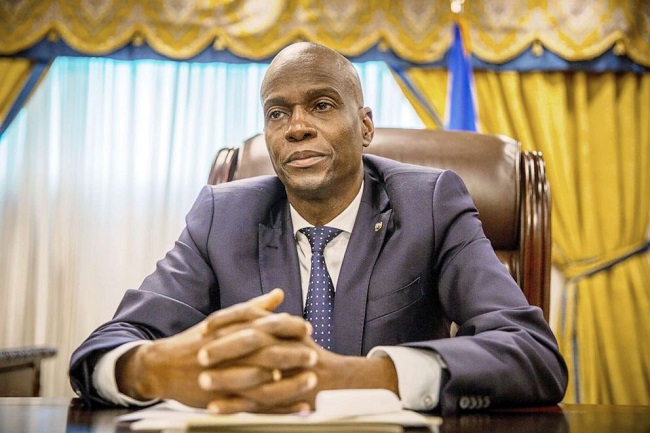The prime minister of Haiti was personally connected to a murder suspect.
After Haiti’s president was slain and the country slipped into upheaval, Ariel Henry became leader of the government, responsible for bringing the criminals to justice and helping the people heal.

Haitian Prime Minister had Close Links with Murder Suspect
New information, however, reveals that Henry kept in touch with a key suspect in the case and that the two remained close even after the murder.
The July assassination of President Jovenel Mose sent an already unstable nation into deeper turmoil, with many of its public institutions in shambles, the capital under siege by gangs, the economy crumbling, and the remaining few elected officials squabbling for control of the government.
It was hoped that Henry’s promotion to prime minister would help heal some of the divisions, garner support from outside, and pave the way for elections to be held. His campaign platform included a promise to bring the killers to justice, reduce bloodshed, and usher in a time of political harmony.
However, the murder investigation slowed down, and doubts about Henry’s dedication to the case surfaced shortly thereafter. His ties to Joseph Felix Badio, a fugitive ex-minister of justice in Haiti on suspicion of arranging the attack that killed Mose, are at the heart of the allegations.
Read Also:
- Hennepin County Chief Medical Examiner Dr. Andrew Baker
- Russia is Losing Tens of Thousands of Outward-Looking Young Professionals
- Vanessa Bryant Gives Powerful Speech Inducting Kobe Bryant into Hall of Fame
Access to Potentially Damaging Phone Data
As well as conversations with Haitian officials and a main suspect in the crime. Badio had several communications with Henry prior to, during, and after the assassination, the most notable of which were two calls lasting a combined seven minutes the morning following the murder.
Two Haitian authorities familiar with the investigation claim that Badio went to see Henry when he learned that he was wanted by police.
Officials claimed that four months after the assassination, while on the run from police, Badio visited Henry at his official residence twice (both times at night). Both times, he was able to stroll right in without being stopped by the prime minister’s security guards.
Although most of the perpetrators were eventually apprehended or slain by police, it is not clear whether current Prime Minister Henry did anything to aid them. Henry’s representative has stated that the former president has no connection to the murder suspect, Badio, and that he has not spoken to Badio since the crime was committed. There was no way to get a response from Badio.
But Haiti’s former chief prosecutor, who was ousted from his office by Henry, has called on the prime minister to address questions in the case. And now, a major suspect in the case has provided comprehensive details regarding the “trusting connection” Badio allegedly shared with Henry.
A former cocaine trafficker and businessman in Haiti named Rodolphe Jaar gave a long interview to while hiding out at a deserted construction site while evading investigators. Jaar acknowledged to helping finance and arrange the scheme.
Jaar claimed that just before the assassination, Badio assured him Henry would be an effective ally after the president was deposed.
According to Jaar, Badio told him, “He is my good friend; I have full control of him,” when Henry, a 72-year-old neurosurgeon, was appointed prime minister.
According to Jaar, he and Badio continued in touch after the murder, evaded authorities together, and even lived in the same safe house for a few days.
Jaar claimed that Badio had gone to Henry for assistance in the hours following the murder, when police had cornered the Colombian mercenaries suspected of carrying out the attack. Although Jaar claimed that Henry told him that he “would make some calls,” this information could not be confirmed.
The probe has been corroborated by three Haitian officials that Henry communicated with Badio on many occasions. Without Henry’s leadership, the authorities (who are not permitted to speak publicly about the issue) say, he would be a formal suspect.
Jaar stated that he believed the plot’s objective to be to overthrow the president rather than kill him, and that he now finds himself caught up in a wider political game that he does not completely understand. A senior security official in the Dominican Republic confirmed on Friday that he had been arrested there after being on the run for six months.
Jaar claims that the conspirators wanted to install former Supreme Court judge Windelle Coq-Thélot as president. According to his story, the coup plotters thought they would have the backing of the Haitian government and military.
Gunmen stormed the president’s house and shot him dead in his bedroom, foiling any attempt to capture him instead of killing him. Jaar insisted he had no idea how or why the plan shifted from requiring the president to resign to assassinating him.
In September, a top Haitian prosecutor named Bedford Claude revealed Henry’s phone calls with Badio and demanded an explanation from the prime minister.
Henry, however, took fast action against the authorities who probed his ties to Badio. Yet, the full scope of the interactions between the two men had not been disclosed before, including the claim made by officials that Badio visited the prime minister’s apartment while evading capture.
The minister of justice, Rockfeller Vincent, claimed he got a call from the prime minister asking him to fire the prosecutor when Claude called Henry for questioning. Vincent has stated that he is not willing to do so. Henry eventually let them both go days later.
Claude, referring to Henry, remarked, “I feel he provides one of the crucial elements in the assassination.”
Henry’s spokesman claimed the officials had been sacked because they had broken the law to further their political goals. This included, among other things, breaking a ban on summons high-ranking officials to court.
Henry stated his primary objective was to hold new elections and then resign down in an interview one month after the murder. However, he has not yet decided when the vote will take place.
Read Also:
- What Is Chauvin Writing During His Trial
- Ida Could Be Devastating Cat 3 Hurricane Near New Orleans
- Madison City schools Reporting Disruptions to Virtual Learning Platform
Conclusion
Jaar has also linked Henry’s police chief, Frantz Elbé, to the crime. According to Jaar, Badio called Elbé, a senior police adviser at the time, at a meeting to outline the scheme and beg for his assistance in obtaining weapons for the coup.
Without offering any proof, Jaar claimed that Elbé assured Badio that he did not have the guns and did not try to stop the coup from happening.
In October, Henry placed Elbé at the helm of the Haitian National Police. In spite of repeated attempts to get a comment out of Elbé, he has been silent.


